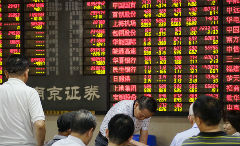Financial sector to be opened further
2018-08-18
China Daily
Foreign investors may soon be allowed to participate in China’s treasury bond futures market, as the securities regulator contemplates more steps to open the bond market and liberalize the interest rate system.
Fang Xinghai, vice-chairman of the China Securities Regulatory Commission, made the remarks on Aug 17 during the Shanghai-based China Financial Futures Exchange’s launch of two-year treasury bond futures.
The treasury bond future contracts are agreements allowing investors to buy or sell treasury bonds at a predetermined price on a set date. Through this derivative product, investors can bet on and profit from the movements in the value of the bonds, a method to facilitate risk hedging against price fluctuations.
Starting on Aug 17, treasury bond futures with two-year maturity can be traded at the exchanges.
The launch of the new product will help form a more reasonable and effective treasury bond market yield curve-a gauge to reflect market-oriented interest rate levels composed by bond yields across different maturities, said Fang.
“That will provide more reliable signals of asset prices, and more importantly, to improve the monetary policy transaction mechanism,” Fang said.
Opening the treasury bond futures market to foreign investors is in line with the country’s strategy of further opening the financial sector, which will attract more overseas funds into the domestic bond market, said Hu Yuyue, director of the Beijing Technology and Business University’s securities and futures research institute.
According to data from China Central Depository and Clearing Co Ltd, foreign institutional investors’ total renminbi bonds in their custody accounts were 1.35 trillion yuan ($196 billion) in July, up by 58.22 billion yuan from a month earlier. The figure represents the 17th consecutive month of increase, up 60.92 percent from a year earlier.
“But more work is needed to build the basic trading mechanism before further opening-up,” Hu said. “A priority task at the moment is to open the treasury bond futures market to domestic commercial banks, as according to the current law, they are still barred from such trading.”
Adding more kinds of diversified futures will further improve the market-oriented trading regime and let the market better find a fair price, according to experts.
It could also improve the country’s interest rate liberalization reform while offering more tools for investors to hedge risks against financial fluctuations.
Wu Changfeng, an analyst with Beijing Financial Derivatives Research Institute, said the participation of commercial banks in the treasury bond futures market will help facilitate the financial sector’s stability.
“It can also make the central bank’s monetary policy more effective as the interest rate could better reflect the market demand, and the credit can be well channeled into the productive sectors, or the real economy,” said Wu.
“Foreign institutional investors’ entry will add more liquidity into the market. Not only commercial banks, insurance companies and pension fund managers should also be encouraged to join the trading,” he added.
China resumed trading of treasury bond futures from Sept 6, 2013, after such trading was suspended for 18 years since 1995 following a series of irregularities. At that time, the China Securities Regulatory Commission approved the trading of the five-year treasury bond futures at China Financial Futures Exchange.
The exchange introduced the 10-year treasury bond futures two years after the resumption.
On Aug 17, China’s five-year treasury bond futures opened lower, with the contract for settlement in September 2018 opening 0.01 percentage point lower at 97.63 yuan.


